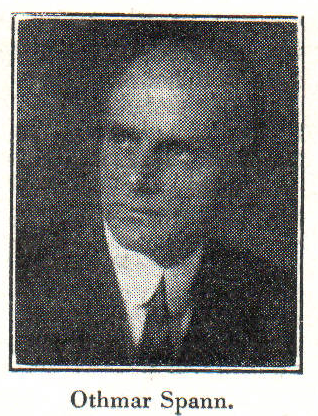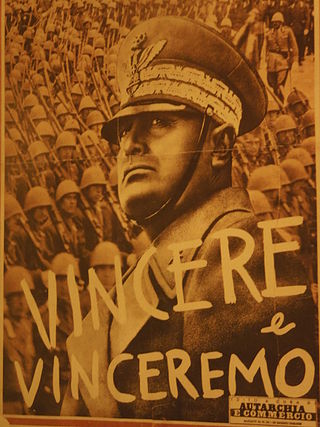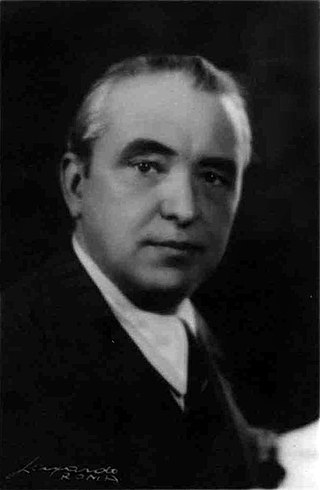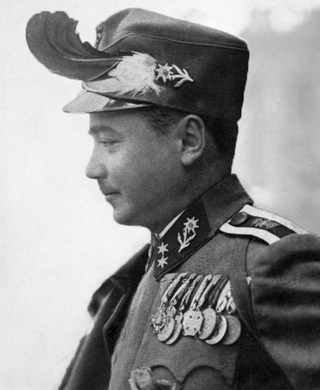
Fascism is a far-right, authoritarian, ultranationalist political ideology and movement, characterized by a dictatorial leader, centralized autocracy, militarism, forcible suppression of opposition, belief in a natural social hierarchy, subordination of individual interests for the perceived good of the nation or race, and strong regimentation of society and the economy.
Right-wing politics is the range of political ideologies that view certain social orders and hierarchies as inevitable, natural, normal, or desirable, typically supporting this position based on natural law, economics, authority, property or tradition. Hierarchy and inequality may be seen as natural results of traditional social differences or competition in market economies.
Christian democracy is a political ideology inspired by Christian social teaching to respond to the challenges of contemporary society and politics. During the nineteenth century, its principal concerns were to reconcile Catholicism with democracy, to answer the "social question" surrounding capitalism and the working class, and to resolve the tensions between church and state. In the twentieth century, Christian democrats led postwar Western and Southern Europe in building modern welfare states and constructing the European Union.

Othmar Spann was a conservative Austrian philosopher, sociologist and economist. His radical anti-liberal and anti-socialist views, based on early 19th century Romantic ideas expressed by Adam Müller et al. and popularized in his books and lecture courses, helped antagonise political factions in Austria during the interwar years.

Verdinaso, sometimes rendered as Dinaso, was a small fascist political movement active in Belgium and, to a lesser extent, the Netherlands between 1931 and 1941.
Corporate statism, state corporatism, or simply corporatism is a political culture and a form of corporatism the proponents of which claim or believe that corporate groups should form the basis of society and the state. By this principle, the state requires all citizens to belong to one of several officially designated interest groups, which consequently have great control of their members. Such interest groups thus attain public status, and they or their representatives participate with national policymaking, at least formally.
In the United Kingdom and elsewhere, High Toryism is the old traditionalist conservatism which is in line with the Toryism originating in the 16th century. High Tories and their worldview are sometimes at odds with the modernising elements of the Conservative Party. Historically, the late eighteenth-century conservatism derived from the Whig Edmund Burke and William Pitt the Younger marks a watershed from the "higher" or legitimist Toryism that was allied to Jacobitism.

The history of fascist ideology is long and it draws on many sources. Fascists took inspiration from sources as ancient as the Spartans for their focus on racial purity and their emphasis on rule by an elite minority. Fascism has also been connected to the ideals of Plato, though there are key differences between the two. Fascism styled itself as the ideological successor to Rome, particularly the Roman Empire. From the same era, Georg Wilhelm Friedrich Hegel's view on the absolute authority of the state also strongly influenced fascist thinking. The French Revolution was a major influence insofar as the Nazis saw themselves as fighting back against many of the ideas which it brought to prominence, especially liberalism, liberal democracy and racial equality, whereas on the other hand, fascism drew heavily on the revolutionary ideal of nationalism. The prejudice of a "high and noble" Aryan culture as opposed to a "parasitic" Semitic culture was core to Nazi racial views, while other early forms of fascism concerned themselves with non-racialized conceptions of the nation.
What constitutes as a definition of fascism and fascist governments has been a complicated and highly disputed subject concerning the exact nature of fascism and its core tenets debated amongst historians, political scientists, and other scholars ever since Benito Mussolini first used the term in 1915. Historian Ian Kershaw once wrote that "trying to define 'fascism' is like trying to nail jelly to the wall".
Articles in social and political philosophy include:
Bourgeois socialism or conservative socialism was a term used by Karl Marx and Friedrich Engels in various pieces, including in The Communist Manifesto. Conservative socialism was used as a rebuke by Marx for certain strains of socialism but has also been used by proponents of such a system. Bourgeois socialists are described as those that advocate for preserving the existing society while only attempting to eliminate perceived evils of the system. Conservative socialism and right-wing socialism are also used as a descriptor, and in some cases as a pejorative, by free-market conservative and right-libertarian movements and politicians to describe more economically interventionist strands of conservatism, such as paternalistic conservatism.

Carlo Costamagna was an Italian lawyer and academic noted as a theorist of corporatism. He worked closely with Benito Mussolini and his fascist movement.
Preußentum und Sozialismus is a book by Oswald Spengler published in 1919 that addressed the connection of the Prussian character with right-wing socialism.

Corporatism is a collectivist political ideology developed as a "Third Way" along with Christian democracy and fascism which advocates the organization of society by corporate groups, such as agricultural, labour, military, business, scientific, or guild associations, on the basis of their common interests. The term is derived from the Latin corpus, or "body".
Paternalistic conservatism is a strand of conservatism, which reflects the belief that societies exist and develop organically and that members within them have obligations towards each other. There is particular emphasis on the paternalistic obligation, referencing the feudal concept of noblesse oblige, of those who are privileged and wealthy to the poorer parts of society. Consistent with principles such as duty, hierarchy, and organic unity, it can be seen as an outgrowth of traditionalist conservatism. Paternalistic conservatives do not support the individual or the state in principle but are instead prepared to support either or recommend a balance between the two depending on what is most practical.

National syndicalism is a far-right adaptation of syndicalism to suit the broader agenda of integral nationalism. National syndicalism developed in France in the early 20th century, and then spread to Italy, Spain, and Portugal.
Ethical socialism is a political philosophy that appeals to socialism on ethical and moral grounds as opposed to consumeristic, economic, and egoistic grounds. It emphasizes the need for a morally conscious economy based upon the principles of altruism, cooperation, and social justice while opposing possessive individualism.
Fascist syndicalism was a trade syndicate movement that rose out of the pre-World War II provenance of the revolutionary industrial unionism movement led mostly by Edmondo Rossoni, Sergio Panunzio, A. O. Olivetti, Michele Bianchi, Alceste De Ambris, Paolo Orano, Massimo Rocca, and Guido Pighetti, under the influence of Georges Sorel, who was considered the "'metaphysician' of syndicalism". The Fascist Syndicalists differed from other forms of fascism in that they generally favored class struggle, worker-controlled factories and hostility to industrialists, which lead historians to portray them as "leftist fascist idealists" who "differed radically from right fascists." Generally considered one of the more radical Fascist syndicalists in Italy, Rossoni was the "leading exponent of fascist syndicalism"., and sought to infuse nationalism with "class struggle".

Para-fascism refers to Authoritarian conservative movements and regimes that adopt characteristics associated with Fascism such as personality cults, paramilitary organizations, symbols and rhetoric but diverge from conventional fascism due to its palingenetic ultranationalism, modernism, and populism. It often emerges in response to the need for a facade of popular support in an age of mass politics, without a genuine commitment to revolutionary nationalism. Instead focusing on maintaining tradition, religion, and culture. Para-fascist regimes may co-opt or neutralize genuine fascist movements. Examples of para-fascism include the regimes and movements of Austrofascism in Austria, Metaxism in Greece, the “New State” of Salazars’ Portugal, and Francoism in Spain.








